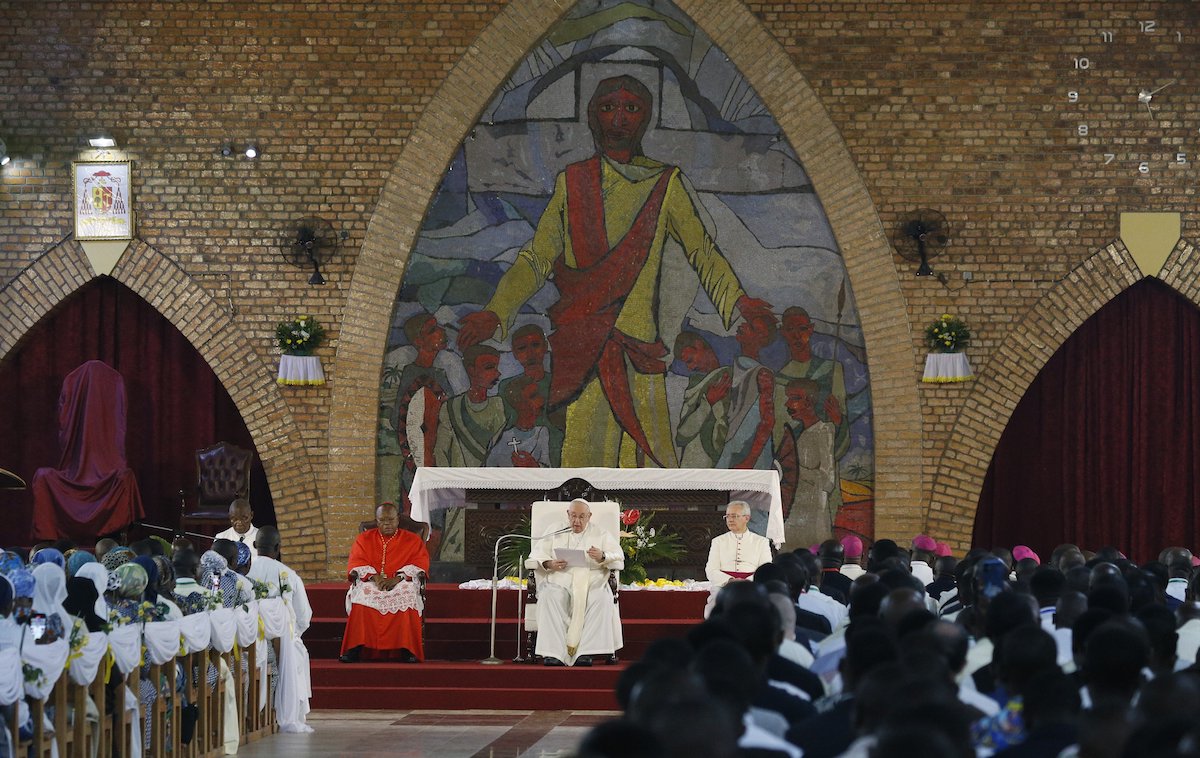By Cindy Wooden, Catholic News Service
KINSHASA, Congo (CNS) — The strength and unity of the Catholic community in Congo and its ability to be an effective force for peace and reconciliation depend in large part on the attitudes, witness and ministry of consecrated women, priests and religious brothers, Pope Francis said.
After an afternoon storm brought wind and rain to the nation’s capital, the pope held an early evening meeting Feb. 2 with some 5,000 priests, religious and seminarians gathered inside and outside the Cathedral of Our Lady of the Congo in Kinshasa.
“If we bow before God in humility, he makes us become like himself, agents of mercy,” the pope said. “If we remain docile in God’s hands, he shapes us to become a people of reconciliation, capable of openness and dialogue, acceptance and forgiveness, who make rivers of peace flow through the arid plains of violence.”
That way, he said, “when the stormy winds of conflict and division blow, we are not broken, for we are filled with the love of God. May you always be docile to the God of mercy, never shattered by the winds of division.”
Although meetings with priests, religious and seminarians are a standard item on papal trip itineraries, the gathering in Kinshasa had an additional character because it took place Feb. 2, the day the church celebrates the World Day for Consecrated Life.
More than 10,000 women religious and just over 6,000 priests, 1,300 religious brothers and four permanent deacons minister in Congo, a nation with more than 52 million Catholics.
Dominican Sister Alice Sala told the pope her country is “a land of martyrs, murders and wars maintained and financed from outside.”
She asked him to be Congo’s “spokesman in the world so that the good of the people may take precedence over interest in our natural resources.”
And despite the “multiple injustices” that plague the nation, she said, the Congolese are “a generous, prayer-loving people, filled with vitality and hope, as Your Holiness has surely observed. That is why we are not discouraged, because we believe in the risen Christ. We are happy to consecrate ourselves to the Lord to witness the Gospel to tormented people.”
Father Léonard Santedi, speaking on behalf of Congo’s diocesan priests, told Pope Francis that the priests believe they are “sent to be courageous witnesses of God in a world that does not accept Gospel values.”
“We are to be witnesses of justice in a world that sinks into corruption and arbitrary condemnations; we are to be witnesses of charity and solidarity in a world that exploits the little ones and pursues selfish interests,” he said. “In a world that prefers tribalism and ‘cliques,’ we must be witnesses to love.”
In fact, the pope said, the priests and religious can be certain that God loves them and will never abandon them, and they are called to share that certainty with everyone they meet.
“You are called to echo this promise of God, to remind others that he made us and we belong to him, and to encourage and accompany the community’s journey in faith toward the one who always walks at our side,” the pope said. “God does not allow the waters to overwhelm us, nor the fire to consume us.”
But priests and religious must take seriously the vows and promises they have made, the pope said.
When a priest or religious is consumed with “managing finances and pursuing some profitable business for ourselves,” he said, “it is scandalous” because they should be “models of sobriety and inner freedom.”
“How beautiful it is, on the other hand, to be transparent in our intentions and free from compromise with money, joyfully embracing evangelical poverty and working side by side with the poor,” the pope said.
“And how beautiful it is to be radiant in living celibacy as a sign of complete availability to the kingdom of God,” Pope Francis said. “May it not be the case that the very vices we want to uproot in others, and in society as a whole, end up taking root in us.”
In March last year, the Congolese bishops’ conference sent priests in the country an exhortation “on priestly chastity and on the rights of children and vulnerable people.”
The letter, later leaked, said only a small portion of priests have children and stable relationships with women, but the bishops insisted that those priests who do should ask to be released from their priestly promises because they have an obligation to support their families.
While Pope Francis was in the cathedral with the church workers, a group of about 20 people, victims of clerical sexual abuse and their supporters, stood outside with a sign asking for a meeting with the pope. It was not clear that he had seen them.
But he told those gathered inside the church, “To be good priests, deacons and consecrated persons, words and intentions are not enough: your lives must speak louder than your words.”
The pope thanked them for being “signs of the presence of Jesus, who walks in the streets of this country, who touches people’s lives and binds their wounds.”
“May you always be channels of the Lord’s consoling presence, joyous witnesses of the Gospel, prophets of peace amid the storms of violence, disciples of love, ever ready to care for the wounds of the poor and suffering,” Pope Francis said.







